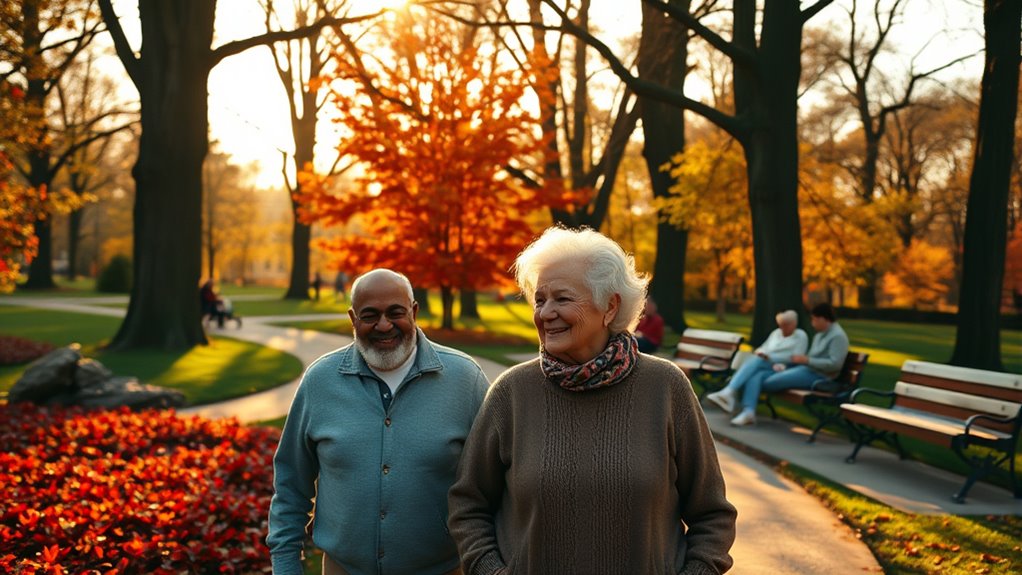A global survey shows that your happiness often increases after age 50. As you grow older, you may find more joy through better health, clearer priorities, and stronger relationships. With retirement plans in place, you feel more secure and excited for leisure and new experiences. Your focus on health and emotional well-being enhances your overall satisfaction. If you stay curious, you’ll uncover even more ways this positive shift can benefit you.
Key Takeaways
- Many individuals report higher happiness levels after age 50 due to shifts in priorities and increased life satisfaction.
- Improved health management and proactive wellness habits contribute to greater well-being in later years.
- Solid retirement planning reduces financial stress, fostering a sense of security and happiness post-50.
- Emotional growth and gratitude for everyday moments enhance overall contentment in older adults.
- Age-related psychological changes often lead to a more relaxed outlook, increasing happiness after 50.

A new global survey reveals that many people find their happiness tends to increase after age 50. If you’re approaching this milestone or already past it, you might notice a shift in how you perceive life’s joys and challenges. This boost in happiness isn’t accidental; it often results from a combination of factors like better health management, clearer priorities, and a more relaxed outlook. Understanding these changes can help you embrace this stage with confidence and purpose.
Happiness often increases after 50 due to better health, clearer priorities, and a more relaxed outlook.
One key aspect that contributes to increased happiness after 50 is your approach to retirement planning. When you have a solid plan in place, you’re more likely to feel secure about your future. Knowing that your finances are in order and that you’ve prepared for different scenarios reduces stress and anxiety. This peace of mind can lead to greater overall satisfaction with life. As you fine-tune your retirement plans, focus on balancing your savings, investments, and potential income streams. Having a clear pathway to enjoy your retirement years allows you to look forward to new experiences, hobbies, or simply more leisure time without worry.
Alongside financial readiness, health management plays a vital role in enhancing happiness. With age, maintaining good health becomes a priority, but it also becomes more manageable when you adopt proactive habits. Regular exercise, balanced nutrition, and routine check-ups help prevent or manage chronic conditions, giving you more energy and independence. When you feel physically well, you’re more inclined to pursue activities you love and stay connected with loved ones. Taking control of your health empowers you, making it easier to enjoy the present and plan for the future. Additionally, improving color accuracy in your home environment can enhance your overall well-being and mood. Moreover, adopting preventive healthcare strategies can significantly contribute to long-term happiness by reducing health-related worries. Developing a consistent health routine can further reinforce this sense of stability and control. Engaging in wellness practices such as mindfulness or meditation can also support mental clarity and emotional resilience. Research shows that mental health plays a crucial role in overall happiness and life satisfaction as we age.
Furthermore, as you age, you often develop a deeper understanding of what truly matters. You tend to value meaningful relationships, personal growth, and experiences over material possessions. This shift in perspective can lead to greater contentment. You might find yourself more grateful for everyday moments and less focused on what you lack. This mental shift, combined with your improved health and solid retirement plans, creates a positive feedback loop that elevates your overall happiness.
In essence, reaching and surpassing age 50 can be a turning point toward greater fulfillment. By actively engaging in retirement planning and prioritizing health management, you set yourself up for a more joyful and satisfying life. It’s about making informed choices, nurturing your well-being, and appreciating the richness of the present. The survey’s findings remind us that happiness isn’t just a fleeting emotion but a state you can cultivate and sustain well into your later years.
Frequently Asked Questions
How Does Income Level Affect Happiness After 50?
You might find that income level impacts happiness after 50, especially as income disparity widens. When you have financial security, you’re more likely to experience peace of mind and overall well-being. But if income disparity is significant, it can lead to stress or feelings of inequality, affecting happiness. Achieving financial stability becomes essential, as it helps you enjoy your retirement years and maintain a positive outlook.
Do Cultural Differences Influence Post-50 Happiness Trends?
You see, cultural differences definitely shape how happiness trends after 50 unfold. Cultural norms and societal expectations can either lift your spirits or weigh you down during this period. In some cultures, aging is celebrated, boosting happiness, while in others, it’s viewed less favorably. So, you might find your happiness influenced by the society you live in, proving that what’s normal elsewhere might not hold true for you.
What Role Does Physical Health Play in Happiness Increases?
Physical health considerably impacts your happiness as you age. When you stay physically active, it boosts your mental well-being, helping you feel more positive and resilient. Regular physical activity can reduce stress, improve sleep, and increase energy levels, all of which contribute to greater happiness. Taking care of your body promotes a sense of accomplishment and control, making it easier to enjoy life’s later years with a positive outlook.
Are There Gender Differences in Happiness After 50?
You might notice that gender disparities influence happiness after 50, shaped by societal expectations. Women often report higher happiness levels, possibly due to stronger social networks and emotional support, while men may experience different challenges. These differences reflect how societal roles and expectations impact well-being. Recognizing these factors can help you understand that happiness isn’t solely personal but also shaped by broader gender dynamics and societal influences.
How Do Relationships Impact Happiness in Older Adults?
Relationships are like a sturdy bridge connecting you to happiness, especially as you age. They foster interpersonal growth and strengthen social networks, which are essential for emotional well-being. Maintaining close ties with family and friends provides support, reduces loneliness, and boosts your sense of belonging. As you nurture these connections, you’ll find that your happiness grows, making your later years more fulfilling and joyful.
Conclusion
As you navigate life’s twists and turns, remember that happiness can bloom anew after 50, like a sunrise breaking through the darkest night. This survey reminds you that age isn’t a barrier but a new horizon of understanding and contentment. Embrace these years with open arms, knowing that your personal garden of joy can flourish even in the later chapters. Your best days may still be waiting just beyond the horizon.









